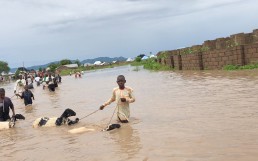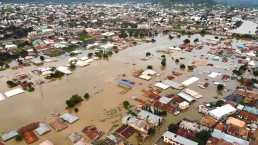When we talk about the danger of climate change, you just have to take a look at the fatal flooding in Nigeria and understand the magnitude of the effect climate change can have on all of us. Since June 2022, Nigeria has been experiencing torrential rainfall as a result of climate change. The heavy rainfall, coupled with the release of excess water from Cameroon’s Lagdo Dam, ultimately led to flooding in Nigeria. As of October 20, 2022, the resultant flooding has claimed over 600 lives, displaced more than 1.4 million people and affected over 2.5 million, injured 2,400 people, and led to a spike in cases of waterborne diseases. The most affected states are Anambra, Bayelsa, Cross River, Delta, Rivers, and Abuja. Bayelsa is undoubtedly the worst hit with over 700,000 displaced persons. The flooding crisis has led to cholera outbreaks of 2.4 case fatality in 31 states of the federation. Data from Nigeria Centre for Disease Control (NCDC) suggests about 10,745 suspected cholera cases and 256 deaths. In the northeastern states – Borno, Adamawa, and Yobe – there are 7700 reported cases of cholera, and 324 deaths with 4.5% case fatality.

Socio-economic effects of the flooding crisis in Nigeria
The flooding crisis has socio-economic implications for Nigeria as a whole.
First, economic activities in the affected areas have been shut down; this will increase the economic crisis in the country and throw more people into poverty.
To make matters worse, the GDP of Nigeria will be at its lowest, because oil-rich states in southern Nigeria are the worst hit by the flooding. And given that oil accounts for about 90% of Nigeria’s forex revenue and over 6% of its GDP, the Nigerian economy will be further impacted negatively.
Agricultural states affected by flooding like Benue, will not be able to produce food, further exacerbating the food inflation in the country.
The literacy level of children in affected areas will drop as they will not be able to attend school, thereby impacting their economic capacity and contribution in years to come.
Do we talk about the billions Nigerians have lost from damaged houses, properties, businesses, and public infrastructures and the money that will go into building new infrastructures and rehabilitating the survivors?
With all these woes bedeviling Nigeria, you would think Nigeria contributes a large chunk to global climate change. On the contrary, Nigeria contributes less than 1% of the world’s global emissions, yet it is ranked in the bottom 20% of countries to be impacted by climate change.
However, this is just a foretaste of things to come if we don’t Take Action to mitigate the effects of climate change.

Our Response
DO Take Action stands in solidarity with everyone experiencing the grievous devastating impact of the flooding and we reaffirm our commitment to supporting victims of the flood.
To that effect, we have launched a relief project, “Donate with DO” to send relief materials like tents, sleeping mats, foodstuffs, mosquito nets, clothes, sanitary pads, toiletries, vaccines and drugs, and money to survivors of the flooding.
We hereby call for donations and collaborations from well-meaning individuals (home and abroad), philanthropists, concerned multinational companies, and the international community, to help us rapidly scale up to address the massive humanitarian needs in the flood-affected areas.
However, beyond the intervention project, DO Take Action has developed actionable frameworks to mitigate the effects of climate change in Africa and ensure a better Africa in the future.
Click here to see how you can TAKE ACTION.
Signed:
Precious Ebere and Century Favour,
Co-Founders, DO Take Action.